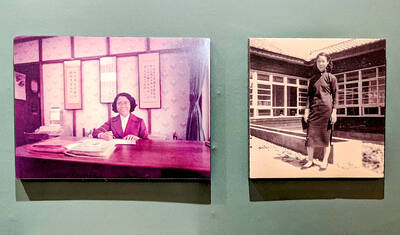Fresh of off its surprisingly successful debut performance this spring, the Taipei Players acting troupe is back for more.
In March, the group presented 7 Stories in front of a sold-out audience at Bliss. The upstairs live house space was transformed into a mini-theater for 50 seated guests. “I think it was a really great response from the audience,” said organizer Sarah Zittrer, who found the community support “overwhelming.”
On Sunday, this “eclectic group of actors, musicians, and yoga teachers” will present five comedies, said Zittrer. Each short is from 10 to 20 minutes in length.
Oral Report and Alternative Lifestyle is a double comedy by Jack Neary about three old ladies gossiping on the porch. It features Katie Partlow, and organizers Zittrer and Mandy Roveda.
Roveda, who directs four of the five plays in Sunday’s show, arrived in Taiwan last August. “I have to do theater no matter where I am,” she said.
Actors Klaire Wu (吳青樺), Ben Lind and Peter Balfry perform in Time Flies, David Ives’ comedy about two mayflies on a date who discover they don’t have long
to live.
Men Are From Milwaukee, Women Are From Phoenix, by M. Lynda Robinson, performed by Brian Domenget and Holly Harrington, uses an argument between a married couple to lampoon the book Men Are From Mars, Women Are From Venus and the lack of communication between the sexes.
Anton Chekhov’s The Bear is the only play not directed by Roveda, with Josh Myers taking the reins in this story of a grieving widow and the landowner
her husband was indebted to. The piece features
Taichung Improv Theater members Jenny McManus
and Nick Ford.

Following the shock complete failure of all the recall votes against Chinese Nationalist Party (KMT) lawmakers on July 26, pan-blue supporters and the Chinese Communist Party (CCP) were giddy with victory. A notable exception was KMT Chairman Eric Chu (朱立倫), who knew better. At a press conference on July 29, he bowed deeply in gratitude to the voters and said the recalls were “not about which party won or lost, but were a great victory for the Taiwanese voters.” The entire recall process was a disaster for both the KMT and the Democratic Progressive Party (DPP). The only bright spot for

Water management is one of the most powerful forces shaping modern Taiwan’s landscapes and politics. Many of Taiwan’s township and county boundaries are defined by watersheds. The current course of the mighty Jhuoshuei River (濁水溪) was largely established by Japanese embankment building during the 1918-1923 period. Taoyuan is dotted with ponds constructed by settlers from China during the Qing period. Countless local civic actions have been driven by opposition to water projects. Last week something like 2,600mm of rain fell on southern Taiwan in seven days, peaking at over 2,800mm in Duona (多納) in Kaohsiung’s Maolin District (茂林), according to

Aug. 11 to Aug. 17 Those who never heard of architect Hsiu Tse-lan (修澤蘭) must have seen her work — on the reverse of the NT$100 bill is the Yangmingshan Zhongshan Hall (陽明山中山樓). Then-president Chiang Kai-shek (蔣介石) reportedly hand-picked her for the job and gave her just 13 months to complete it in time for the centennial of Republic of China founder Sun Yat-sen’s birth on Nov. 12, 1966. Another landmark project is Garden City (花園新城) in New Taipei City’s Sindian District (新店) — Taiwan’s first mountainside planned community, which Hsiu initiated in 1968. She was involved in every stage, from selecting

As last month dawned, the Democratic Progressive Party (DPP) was in a good position. The recall campaigns had strong momentum, polling showed many Chinese Nationalist Party (KMT) lawmakers at risk of recall and even the KMT was bracing for losing seats while facing a tsunami of voter fraud investigations. Polling pointed to some of the recalls being a lock for victory. Though in most districts the majority was against recalling their lawmaker, among voters “definitely” planning to vote, there were double-digit margins in favor of recall in at least five districts, with three districts near or above 20 percent in